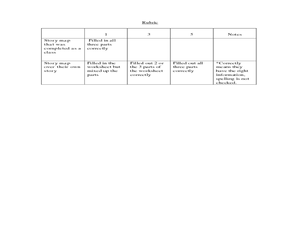Curated OER
Direct and Indirect Characterization
How does an author develop his or her characters? Using the short story "On the Bridge" by Todd Strasser, readers study character development by looking for examples of both direct and indirect characterization. They plot these points on...
Curated OER
Biopoem Strategy as Part of a Character Analysis for Of Mice and Men
Readers of John Steinbeck’s Of Mice and Men will learn much “more than what (is) said to them” as they use the biopoem format and craft a poem about one of the major characters in Steinbeck’s tragic story of Geroge Milton and Lennie...
Project B.A.S.I.C. Child Development Specialist and Child Care Consultation
Better Attitudes and Skills in Children
Little kids often have very big feelings, and need help expressing them. A set of social emotional lessons provide tangible ways for young elementary learners to visualize their emotions, focus on clear communication, and channel their...
Curated OER
What a Character!
Guide your readers to explore character traits. As a class, discuss and record the traits of a commonly-known fairy tale character. Then do the same with the main character in the class novel. Finally, have learners use magazines and...
Curated OER
Horse Character: Ceramics Lesson
Animals oftentimes elicit various characteristics which make them symbolic or representative of human feeling, action, or emotion. The class creates horse characters out of clay to show character action and symbolism. This is a great...
Curated OER
Gus and Grandpa and the Two Wheeled Bike: comprehension skills
What a fantastic idea! Give these bookmarks to your readers to help them conquer pages 206-222 of Gus and Grandpa and the Two Wheeled Bike. They make inferences, conduct close reads, search for cause and effects, and focus on Gus, the...
Curated OER
Fortune Cookies Motivate Writing
Fortune cookies are used as motivation for a story. In this creative writing lesson, young writers review the six traits process. They discuss interesting characters, setting, problem and solution in a story. Original stories based on...
EngageNY
Close Reading of The Boy Who Loved Words: How Do People Build Their Word Power?
Third graders practice the skills of identifying the main message in a story, describing the main character, and sorting the key details of a story into specific categories. The story they read is, The Boy Who Loved Words. Using a...
Curated OER
Unsent Letter: Characterization in Briar Rose
After completing Jane Yolen’s Briar Rose, class members assume the voice of Gemma and craft a personal letter to her granddaughter telling Becca how she feels about Becca’s actions and the discoveries at Chelmno. Complete directions for...
Missouri Department of Elementary
Goldilocks Revisited
After a read-aloud of the story Goldielocks and the Three Bears, scholars gather into small groups to answer a series of questions. Peers examine the idea of smart decisions and identify three feelings of characters alongside three...
Curated OER
Novel Character Study
Students complete a character study using a database to compile information from a novel. They design a five slide presentation highlighting the character's reaction to different situations in the book. They write an acrostic poem using...
Curated OER
Story Stew
Learners identify the elements of a story. For this reading and writing lesson, pupils read the book, Tyrone the Horrible by Hans Wihelm and then identify the characters, setting, and plot of the story.This lesson includes adaptations...
Curated OER
Of Mice and Men by John Steinbeck: Chapter 3 Reading Check
"I wisht somebody'd shoot me if I got old an' a cripple." Young readers examine one of the ways Steinbeck brings his characters to life by closely examining what characters say and imaging why Steinbeck choose these words. A great way to...
Curated OER
Clay Heads
Sculpting can be a rewarding way to accent a lesson plan in any subject. This project requires learners to design and sculpt a head out of clay. The entire process is outlined in this resource; including photos and suggested materials....
Museum of Disability
Ian’s Walk and Apples for Cheyenne
Help young learners understand friendship and empathy with two reading comprehension lessons. Each lesson focuses on a story about a child with autism, and encourages readers to compare and contrast the characters to each other and to...
Curated OER
Character Map #1
Here’s a great graphic organizer that can be used with any narrative. Readers select a character and record feelings, descriptions, behaviors, and personality traits. The template could be used for group work or as a prewriting activity...
Polk Bros Foundation
I Can Infer Motive and Effects for an Action
Help your pupils determine just what makes a character or person tick by zooming in on one character or person. This graphic organizer is dedicated to analyzing one person and asks pupils to infer a personality trait, note down an action...
Curated OER
Lesson 3: Character Values
A value is something a person or character thinks is right or good; it's also a characteristic of a fairy tale. Learners discuss how fairy tale characters often have or exemplify a specific value. They compare the values found in The...
Curated OER
How Fast Are You?
Students explore constructive ways of handling conflict. In this conflict resolution lesson, students brainstorm things that make them angry, sad, happy, etc. Students listen to a story and identify ways the characters handled conflict...
Teacher's Corner
Is There a Wocket in my Pocket?
Accompany Dr. Seuss' Is There a Wocket in my Pocket? with this graphic organizer. Young readers make inferences about why the main character has certain feelings towards the creatures found in the story.
Curated OER
Characters: People and Feelings
In this character activity, students read sentences, then choose the word in a pair that correctly describes the feeling in the sentences. One example is completed for students.
Curated OER
How We Feel
Students read and discuss a simple rhyme. They are taught how their feelings make them unique. Students are taught ways to be healthy. They are shown what to do when they don't feel well. Students use drawing and writing skills to...
Curated OER
The True Confessions of Charlotte Doyle: Graphic Organizer
After completing the first five chapters of The True Confessions of Charlotte Doyle By Avi, use direct quotes to make inferences about how Charlotte feels about certain characters. Later, when the novel has concluded, revisit the text to...
Learning to Give
What Are Your Thoughts?
The varying responses of the characters in Mildred Taylor's Roll of Thunder, Hear My Cry to the discrimination they experience or perpetrate provides readers with an opportunity to not only examine the feelings of the characters but to...

























